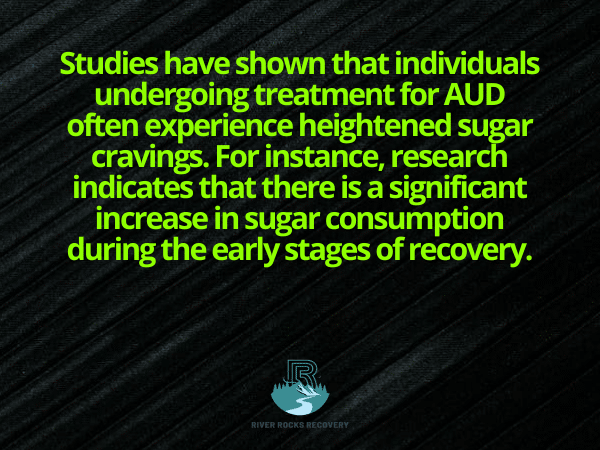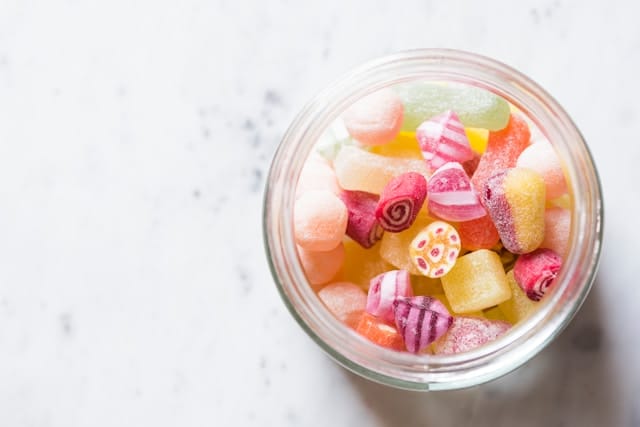Many people in addiction recovery experience unexpected and intense sugar cravings. This can be frustrating, especially for those trying to establish healthier habits. Individuals who once craved alcohol, opioids, meth, or cocaine often find themselves reaching for sweets, sugary drinks, and processed carbs.
While this might seem harmless at first, excess sugar consumption can lead to weight gain, mood swings, increased cravings, and potential cross-addiction behaviors. Understanding the connection between sugar, addiction, and the brain’s reward system is key to overcoming these cravings and building a healthier recovery lifestyle.
At River Rocks Recovery, we help individuals navigate early and long-term recovery challenges, including sugar cravings. Our comprehensive addiction treatment programs, including Partial Hospitalization (PHP), Intensive Outpatient (IOP), Outpatient (OP), and Sober Living, provide nutritional counseling, behavioral therapy, and holistic wellness support to help individuals develop sustainable, healthy habits.
In this article, we’ll explore:
- Why sugar cravings happen in addiction recovery
- The science behind sugar, addiction, and the brain’s reward system
- The dangers of excess sugar in recovery
- How to manage sugar cravings without replacing one addiction with another
- How professional addiction treatment supports long-term recovery
Why Do Sugar Cravings Happen in Addiction Recovery?
After quitting drugs or alcohol, the body and brain go through significant changes. Some of the most common reasons for intense sugar cravings in early recovery include:
1. Dopamine Deficiency: The Brain’s Search for Pleasure
Drugs and alcohol flood the brain with dopamine, the neurotransmitter responsible for pleasure and reward. Over time, the brain becomes dependent on these substances for dopamine production.
When someone stops using, their dopamine levels drop significantly, leading to:
- Depression
- Anxiety
- Fatigue
- Low motivation
- Intense cravings for quick dopamine boosts
Since sugar also triggers dopamine release, the brain seeks out sugar as a substitute for drugs or alcohol. This is why many people in early sobriety crave sweets, candy, soda, and other highly processed carbs.
2. Blood Sugar Imbalances and Poor Nutrition
Substance abuse often leads to irregular eating habits, malnutrition, and blood sugar imbalances.
- Alcohol and opioids disrupt glucose metabolism, leading to low blood sugar levels and cravings for fast energy sources like sugar.
- Stimulants like meth and cocaine suppress appetite, so when individuals quit, their bodies demand quick-digesting foods to restore lost energy.
After quitting substances, blood sugar fluctuations can cause:
- Sudden hunger for sweets
- Mood swings and irritability
- Energy crashes followed by sugar cravings
3. Gut Health and Sugar Cravings
Substance abuse disrupts the gut microbiome, which plays a role in digestion, mood, and cravings.
- Alcohol, opioids, and methamphetamine kill beneficial gut bacteria, leading to increased cravings for sugar.
- An imbalance in gut bacteria causes the body to crave processed carbs and refined sugars.
Healing the gut through a healthy diet, probiotics, and balanced meals can help reduce sugar cravings over time.
4. Emotional and Psychological Triggers
Many people in recovery turn to sugar as an emotional coping mechanism. Sugar provides a temporary sense of comfort and relief, similar to how drugs or alcohol once did.
Common emotional triggers for sugar cravings include:
- Stress and anxiety – Sugar can temporarily ease stress by releasing dopamine.
- Depression and low mood – Sugar provides a short-lived boost, but it often leads to an energy crash and worsened mood.
- Boredom or habit – Many people in addiction recovery replace substance use rituals with eating sweets.
While sugar provides temporary comfort, excessive consumption can lead to long-term health problems and increased cravings.
How Sugar Affects Mood, Energy, and Recovery
Although sugar may seem like a harmless indulgence, excessive sugar intake can cause problems in recovery. Here’s how:
1. Increased Mood Swings and Depression
Sugar creates a quick energy boost, but it’s followed by a crash, which can worsen:
- Irritability
- Anxiety
- Depression
- Fatigue
This can be especially difficult for individuals experiencing post-acute withdrawal symptoms (PAWS), as sugar fluctuations can make mood swings more intense.
2. Cross-Addiction Risks
Cross-addiction happens when someone replaces one addiction with another. Sugar, caffeine, nicotine, and other habit-forming substances can become new compulsive behaviors.
Some common examples of cross-addiction include:
- Replacing alcohol addiction with excessive sugar consumption
- Using caffeine, nicotine, or sugary drinks to manage cravings
- Binge eating or emotional eating as a coping mechanism
While sugar may seem like a safer alternative, excessive consumption can trigger compulsive behaviors similar to drug addiction.
3. Weight Gain and Metabolic Issues
Weight gain in recovery is common due to:
- Increased sugar consumption
- Slower metabolism after quitting stimulants
- Cravings for comfort foods
This can lead to:
- Low self-esteem
- Increased risk of diabetes and heart disease
- Higher relapse risk due to emotional distress
4. Inflammation and Chronic Health Problems
Long-term sugar overconsumption can contribute to:
- Diabetes and insulin resistance
- Fatty liver disease (especially in former alcohol users)
- Increased inflammation, which worsens chronic pain
Since individuals in recovery already face higher health risks, managing sugar intake is essential for long-term well-being.

How to Reduce Sugar Cravings in Recovery
Here are some effective strategies to manage sugar cravings while maintaining a healthy, balanced recovery:
1. Eat More Protein and Healthy Fats
Protein and healthy fats help stabilize blood sugar levels, reducing the urge for sugar.
Try adding:
- Lean meats, eggs, and fish
- Nuts, seeds, and avocados
- Greek yogurt and cottage cheese
2. Drink More Water
Dehydration can mimic sugar cravings, so drinking plenty of water, herbal tea, or sugar-free electrolyte drinks helps keep cravings in check.
3. Choose Complex Carbohydrates
Instead of refined sugar, focus on fiber-rich whole foods like:
- Quinoa, oats, and whole grains
- Sweet potatoes and legumes
- Vegetables and low-sugar fruits
4. Manage Stress and Emotions Without Sugar
Since many sugar cravings are emotionally triggered, try:
- Mindfulness and meditation
- Exercise and movement
- Therapy and support groups
5. Prioritize Sleep and Rest
Lack of sleep increases cravings for sugar and processed foods. Aim for 7-9 hours of quality sleep each night.
How River Rocks Recovery Supports Long-Term Recovery
At River Rocks Recovery, we provide comprehensive addiction treatment programs that address both substance use and lifestyle challenges like sugar cravings.
Our programs include:
- Partial Hospitalization Program (PHP) – Intensive treatment for early recovery.
- Intensive Outpatient Program (IOP) – Flexible therapy and nutrition counseling.
- Outpatient Program (OP) – Long-term recovery support.
- Sober Living Program – A structured, supportive environment.
Conclusion
Sugar cravings in addiction recovery are common, but they don’t have to control your journey. Understanding why they happen—whether due to dopamine imbalances, poor nutrition, or emotional triggers—is the first step in managing them effectively. While sugar can offer temporary relief, excessive consumption can disrupt mood stability, lead to weight gain, and reinforce addictive behaviors.
The good news is that there are healthier ways to manage cravings while supporting long-term sobriety. By focusing on balanced nutrition, proper hydration, stress management, and emotional healing, you can reduce cravings naturally and build a healthier lifestyle.
If you or a loved one is struggling with substance use disorder and its related challenges, we are here to help. Call River Rocks Recovery at 888.905.6281 today for a confidential consultation. Recovery is about more than quitting substances—it’s about creating a healthier, more fulfilling life. Let us help you on your journey!
FAQ About Sugar Cravings in Addiction Recovery
Why do people in addiction recovery crave sugar?
Sugar cravings in recovery are common due to:
- Dopamine deficiency – Sugar temporarily boosts dopamine levels, acting as a substitute for drugs or alcohol.
- Blood sugar imbalances – Substance abuse disrupts metabolism, leading to cravings for quick-energy foods.
- Emotional triggers – Many people use sugar as a coping mechanism for stress, anxiety, or boredom.
Are sugar cravings a sign of cross-addiction?
Yes, excessive sugar intake in recovery can be a form of cross-addiction, where individuals replace drugs or alcohol with another compulsive behavior, such as overeating sugary foods.
How does sugar affect long-term recovery?
Excessive sugar consumption can:
- Cause mood swings and energy crashes, making emotional stability harder to maintain.
- Lead to weight gain, diabetes, and inflammation, increasing health risks.
- Reinforce addictive behaviors, making relapse more likely.
What are some healthier alternatives to sugar?
To reduce sugar cravings, try:
- Protein-rich foods like lean meats, eggs, and nuts to stabilize blood sugar.
- Healthy fats such as avocados and olive oil to keep you full longer.
- Complex carbs like whole grains and vegetables for sustained energy.
Can quitting sugar help prevent relapse?
Yes. Managing sugar intake helps regulate mood, energy, and cravings, reducing the risk of relapse by preventing emotional highs and lows.
How does River Rocks Recovery help individuals manage sugar cravings?
Our addiction treatment programs, including Partial Hospitalization (PHP), Intensive Outpatient (IOP), Outpatient (OP), and Sober Living, provide:
- Nutritional counseling to help create healthy eating habits.
- Behavioral therapy to address emotional triggers behind cravings.
- Holistic recovery support to promote long-term wellness.




























